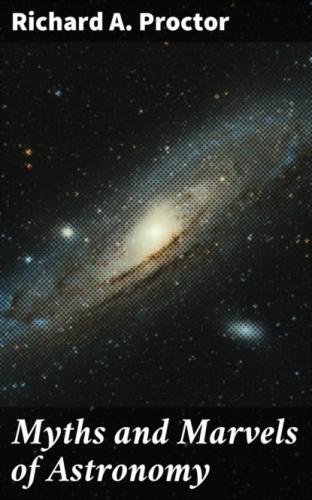Richard A. Proctor
Myths and Marvels of Astronomy
Published by Good Press, 2019
EAN 4057664626134
Table of Contents
MYTHS AND MARVELS OF ASTRONOMY
II. THE RELIGION OF THE GREAT PYRAMID.
III. THE MYSTERY OF THE PYRAMIDS.
IV. SWEDENBORG'S VISIONS OF OTHER WORLDS.
V. OTHER WORLDS AND OTHER UNIVERSES.
X. ON SOME ASTRONOMICAL PARADOXES.
XI. ON SOME ASTRONOMICAL MYTHS.
XII. THE ORIGIN OF THE CONSTELLATION-FIGURES.
PREFACE.
The chief charm of Astronomy, with many, does not reside in the wonders revealed to us by the science, but in the lore and legends connected with its history, the strange fancies with which in old times it has been associated, the half-forgotten myths to which it has given birth. In our own times also, Astronomy has had its myths and fancies, its wild inventions, and startling paradoxes. My object in the present series of papers has been to collect together the most interesting of these old and new Astronomical myths, associating with them, in due proportion, some of the chief marvels which recent Astronomy has revealed to us. To the former class belong the subjects of the first four and the last five essays of the present series, while the remaining essays belong to the latter category.
Throughout I have endeavoured to avoid technical expressions on the one hand, and ambiguous phraseology (sometimes resulting from the attempt to avoid technicality) on the other. I have, in fact, sought to present my subjects as I should wish to have matters outside the range of my special branch of study presented for my own reading.
RICHARD A. PROCTOR.
MYTHS AND MARVELS
OF
ASTRONOMY
I.
ASTROLOGY.
Signs and planets, in aspects sextile, quartile, trine, conjoined, or opposite; houses of heaven, with their cusps, hours, and minutes; Almuten, Almochoden, Anahibazon, Catahibazon; a thousand terms of equal sound and significance.—Guy Mannering.
… Come and see! trust thine own eyes.
A fearful sign stands in the house of life,
An enemy: a fiend lurks close behind
The radiance of thy planet—oh! be warned!—Coleridge.
Astrology possesses a real interest even in these days. It is true that no importance attaches now even to the discussion of the considerations which led to the rejection of judicial astrology. None but the most ignorant, and therefore superstitious, believe at present in divination of any sort or kind whatsoever. Divination by the stars holds no higher position than palmistry, fortune-telling by cards, or the indications of the future which foolish persons find in dreams, tea-dregs, salt-spilling, and other absurdities. But there are two reasons which render the history of astrology interesting. In the first place, faith in stellar influences was once so widespread that astrological terminology came to form a part of ordinary language, insomuch that it is impossible rightly to understand many passages of ancient and mediæval literature, or rightly to apprehend the force of many allusions and expressions, unless the significance of astrological teachings to the men of those times be recognised. In the second place, it is interesting to examine how the erroneous teachings of astrology were gradually abandoned, to note the way in which various orders of mind rejected these false doctrines or struggled to retain them, and to perceive how, with a large proportion of even the most civilised races, the superstitions of judicial astrology were long retained, or are retained even to this very day. The world has still to see some superstitions destroyed which are as widely received as astrology ever was, and which will probably retain their influence over many minds long after the reasoning portion of the community have rejected them.
Even so far back as the time of Eudoxus the pretensions of astrologers were rejected, as Cicero informs us ('De Div.' ii. 42). And though the Romans were strangely superstitious in such matters, Cicero reasons with excellent judgment against the belief in astrology. Gassendi quotes the argument drawn by Cicero against astrology, from the predictions of the Chaldæans that Cæsar, Crassus, and Pompey would die 'in a full old age, in their own houses, in peace and honour,' whose deaths, nevertheless, were 'violent, immature, and tragical.' Cicero also used an argument whose full force has only been recognised in modern times. 'What contagion,' he asked, 'can reach us from the planets, whose distance is almost infinite?' It is singular that Seneca, who was well acquainted with the uniform character of the planetary motions, seems to have entertained no doubt respecting their influence. Tacitus expresses some doubts, but was on the whole inclined to believe in astrology. 'Certainly,' he says, 'the majority of mankind cannot be weaned from the opinion that at the birth of each man his future destiny is fixed; though some things may fall out differently from the predictions, by the ignorance of those who profess the art; and thus the art is unjustly blamed, confirmed as it is by noted examples in all ages.'[1]
Probably, the doubt suggested by the different fortunes and characters of men born at the same time must have occurred to many before Cicero dwelt upon it. Pliny, who followed Cicero in this, does not employ the argument quite correctly, for he says that, 'in every hour, in every part of the world, are born lords and slaves, kings and beggars.' But of course, according to astrological principles, it would be necessary that two persons,
